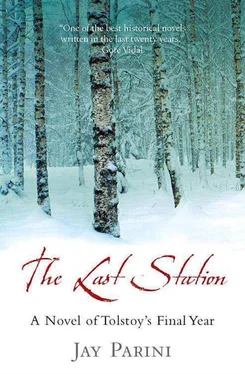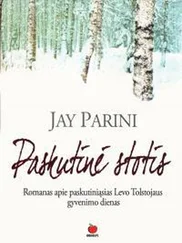Suddenly it dawned on him that what had been weighing him down and would not disappear was vanishing, all at once – from two sides, ten sides, everywhere! He grieved for them and wanted to comfort them. To free them and himself from this anguish. ‘And the pain?’ he asked himself. ‘Where is it now? Where are you, Pain?’
He waited, anxious, for its return.
‘Ah, it’s still there. Well, so what? Let it be.’
‘And death? What is death?’
He tried to locate his accustomed fear of death and could not. Where was death? What death? He felt no fear because death did not exist.
Instead of death was light.
‘So, that’s it!’ he cried. ‘What joy!’
This all happened in an instant, but the significance was lasting. For those around him, his anguish stretched out for another two hours. A rattle invaded his chest; his wracked body trembled. Then the rattling and wheezing ceased.
‘It’s finished,’ someone said who stood beside him.
He heard this comment and repeated it in his soul.
‘Death is finished,’ he said to himself. ‘Death is no more.’
He sucked in quickly, broke off in midbreath, stretched out, and died.
As he lay dying, I spent my days at Telyatinki. I wrote in my diaries – trying to remember everything I could about our last days together – and I worked on an essay about Tolstoy’s early years in the Caucasus. In 1854, in Sevastopol – having come from Odessa by ship in early November – he had spent some days helping in a military hospital. Several months before, on a long walk in Zasyeka Wood, he’d told me about his time there.
He was in love with a Cossack girl, ‘a dark-eyed beauty,’ he’d called her. ‘She was as slender hipped as a boy, with short black hair – a sign that she was independent. The others wore their hair long, like gypsies.’
He and a young infantry officer, named Ilya, had become close friends through many months. They spent their days gambling and riding. They occupied their nights with whoring among the gypsies. But Leo Nikolayevich was drawn to the Cossack girl, as was Ilya. They played cards and, jokingly, bet on the girl. The man who lost would have to sleep alone that night or with another woman.
Each afternoon, the carts would arrive from the battlefield, bringing the corpses. By chance, one day Leo Nikolayevich was nearby when they arrived. ‘It was the most brilliant day of autumn,’ he said, with his usual recall of detail. ‘A cloudless sky. The plane trees tossed in the wind.’ A senior officer motioned to Leo Nikolayevich. ‘Here, give a hand!’ He rushed to the cart, where several officers lay mutilated among the ordinary infantrymen. One of them, to his amazement, was Ilya.
Ilya’s neck was raw where a bullet had got him at the base of the throat, but his face was untouched – ‘even lovely,’ as Leo Nikolayevich remembered. Scarcely able to control himself, he lifted Ilya from the cart and carried him to the morgue in his arms. The sleeves of his jacket were stained so badly that he threw it in the fire.
Why had this happened to Ilya and not to Leo Nikolayevich? Was life fundamentally irrational? He could not answer these questions.
That night, he went to the house of the Cossack girl. He did not tell her what had happened to Ilya. ‘I was overcome by a powerful feeling of what was probably lust, but it felt like… love.’ He lay with her till dawn, he said, swearing to himself that this would be their last night together. He was sinning against God, that he knew. But – as Martin Luther put it – he was sinning boldly.
‘You know, I still think of her quite often,’ Leo Nikolayevich told me. There was a strange look in his eyes as he said that, a mingling of nostalgia, regret, and genuine sorrow.
I don’t know why, but I was thinking of that Cossack girl as I sat beside Masha, who had come down from St Petersburg to attend the funeral the next morning. She arrived on the late train at Tula. I met her in a droshky, which I drove myself.
We turned abruptly into the long gravel driveway. Telyatinki was lit up like a skull, with candles burning in the windows. The oak trees, which still retained their leaves, chittered in the cold wind. ‘Welcome home,’ I said to Masha, who smiled ruefully.
The household was in mourning, of course, and the place had a ghostly feel to it. Chertkov and Sergeyenko had been with Leo Nikolayevich throughout his ordeal, and reports were just filtering back. The funeral would attract large crowds. Indeed, the trains from Moscow and elsewhere had been crammed all day, with hundreds of people – most of whom had never met Tolstoy – already camped on the grounds at Yasnaya Polyana.
‘I can hardly believe you’re here,’ I said. ‘I guess I won’t have to put today’s letter in the mail. You can have it.’ She grinned as I handed her the envelope and stuffed it into her coat pocket.
I reached for her hand and held it, briefly. She looked at me with an intensity that almost hurt.
We had a glass of tea in the kitchen.
‘I think I know you a lot better now,’ I said to her, softly. ‘I’m almost afraid that, face to face, we won’t speak directly to one another. It’s much easier in letters. I’m a more honest person in print.’
‘You keep too much to yourself – even in your letters.’
‘I don’t want to.’
‘There’s no reason that we can’t speak openly,’ she said.
I saw that she shivered.
‘Are you cold?’
‘I’m all right.’
I took off my coat and put it around Masha’s narrow shoulders, inhaling the lovely odor of her hair, which had a slightly waxy sheen that I did not mind. It smelled of water and mud.
‘You’ve been traveling all day. You must be exhausted.’
‘It’s so good to see you, I don’t care.’
When we had drunk our tea, I carried her leather case to her room, which I had prepared with fresh sheets.
‘Thank you,’ she said timidly.
Closing the door behind us, I reached my hand to her face and let my fingers graze the skin lightly, lightly. She closed her eyes.
‘May I kiss you, Masha?’
She said nothing. She just opened her eyes. They were deep and wet, blue-green in the candlelight, large as a calf’s.
I could feel the shyness slipping away from me, sloughing off like a snake’s skin. Emboldened, I pressed my lips to hers. I put my hands firmly on her hips.
When she reached her arms around my shoulders, I knew that all would be well.
‘I love you, Valya,’ she said.
‘I’m so glad.’
That night we made love – not the frenzied lovemaking I had expected, but a gentle, almost ceremonious mingling. I knew I would never be the same again.
For several hours we nestled against each other like children. She seemed to sleep hard, but I lay solidly awake, astounded by everything that was happening. I did not even want to sleep. I wanted to feel everything, the swollen sheets, the full length of her body beside mine, her thighs and back and arms and shoulders. I was floating now, permeable, fully human – a creature of skin and hair and bones.
Near dawn, I saw that Masha was awake and kissed her gently on the forehead. ‘I wish I understood what love is,’ I said.
‘You don’t have to understand it,’ she said. ‘It’s not something that needs analysis.’
People were talking at the end of the corridor now, and I realized it was time to get up if we were to meet the train at Zasyeka Station, the train that was bringing the body of Leo Nikolayevich home to rest.
‘It’s here!’ a muzhik shouted.
The train, an hour late, wheezed into the station. It was a briskly cold morning, with a cover of dry snow in the railway yard; milkweed and mullein – the surviving bones of summer – poked through the white crust. In a few places, bare ground showed through, the black Russian dirt I have always loved. I heard eight bells ring in the chapel tower.
Читать дальше












